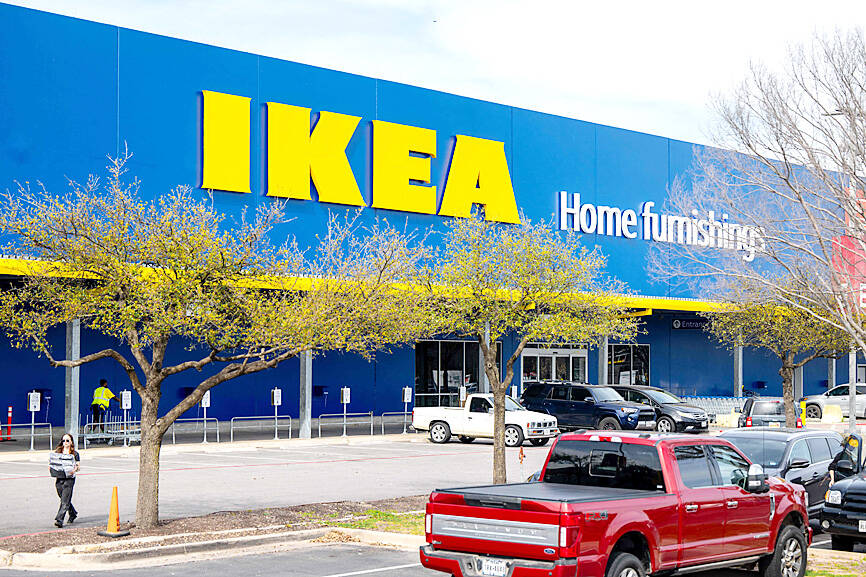Swedish furniture maker IKEA plans to spend about 300 million euros (US$327 million) in South Korea over the next three years to increase market share in the East Asian country.
“We are investing a lot in Asia,” Tolga Oncu, head of the company’s retail Ingka Group, said in an interview in Goyang, South Korea, on Saturday on his first visit to the country since 2018.
The group is to open another so-called blue box store in Seoul and is considering “many more smaller formats.”

Photo: AFP
IKEA, known for its do-it-yourself business model, has four outlets in South Korea, and offers online shopping and delivery. The company is seeking to increase consumers’ access to stores, Oncu said.
“Maybe you don’t need to walk more than 15 minutes to get your products in a convenience store or somewhere,” he said.
IKEA has in the past few years invested in automation improvement of its shipping service, which can lead to lower prices, he said.
“Korea has one of the highest quality of last-mile deliveries,” he said.
The brand is planning to cut prices globally and is looking at 10 percent to 20 percent reductions for key products in South Korea, he said.
In the US, IKEA has lowered retail costs on almost 1,000 products, including on its popular Billy bookcase, and plans to keep cutting.
The firm began the US price-cutting push in January and is also lowering prices across the more than 60 other markets where it operates. Consumers have responded by increasing their purchases of those cheaper items at IKEA stores.
The furniture maker sells 9,500 products and raised prices across the board for the first time in decades during the COVID-19 pandemic because of supply-chain disruptions. Now, declines in the prices of raw materials and lower transportation costs have enabled the cuts, the firm said.
“I think in general for IKEA worldwide, it is looking like this is going to be one of the biggest price reductions that we have ever done in one year,” Oncu said.

When an apartment comes up for rent in Germany’s big cities, hundreds of prospective tenants often queue down the street to view it, but the acute shortage of affordable housing is getting scant attention ahead of today’s snap general election. “Housing is one of the main problems for people, but nobody talks about it, nobody takes it seriously,” said Andreas Ibel, president of Build Europe, an association representing housing developers. Migration and the sluggish economy top the list of voters’ concerns, but analysts say housing policy fails to break through as returns on investment take time to register, making the

‘SILVER LINING’: Although the news caused TSMC to fall on the local market, an analyst said that as tariffs are not set to go into effect until April, there is still time for negotiations US President Donald Trump on Tuesday said that he would likely impose tariffs on semiconductor, automobile and pharmaceutical imports of about 25 percent, with an announcement coming as soon as April 2 in a move that would represent a dramatic widening of the US leader’s trade war. “I probably will tell you that on April 2, but it’ll be in the neighborhood of 25 percent,” Trump told reporters at his Mar-a-Lago club when asked about his plan for auto tariffs. Asked about similar levies on pharmaceutical drugs and semiconductors, the president said that “it’ll be 25 percent and higher, and it’ll

CHIP BOOM: Revenue for the semiconductor industry is set to reach US$1 trillion by 2032, opening up opportunities for the chip pacakging and testing company, it said ASE Technology Holding Co (日月光投控), the world’s largest provider of outsourced semiconductor assembly and test (OSAT) services, yesterday launched a new advanced manufacturing facility in Penang, Malaysia, aiming to meet growing demand for emerging technologies such as generative artificial intelligence (AI) applications. The US$300 million facility is a critical step in expanding ASE’s global footprint, offering an alternative for customers from the US, Europe, Japan, South Korea and China to assemble and test chips outside of Taiwan amid efforts to diversify supply chains. The plant, the company’s fifth in Malaysia, is part of a strategic expansion plan that would more than triple

Taiwanese artificial intelligence (AI) server makers are expected to make major investments in Texas in May after US President Donald Trump’s first 100 days in office and amid his rising tariff threats, Taiwan Electrical and Electronic Manufacturers’ Association (TEEMA, 台灣電子電機公會) chairman Richard Lee (李詩欽) said yesterday. The association led a delegation of seven AI server manufacturers to Washington, as well as the US states of California, Texas and New Mexico, to discuss land and tax issues, as Taiwanese firms speed up their production plans in the US with many of them seeing Texas as their top option for investment, Lee said. The